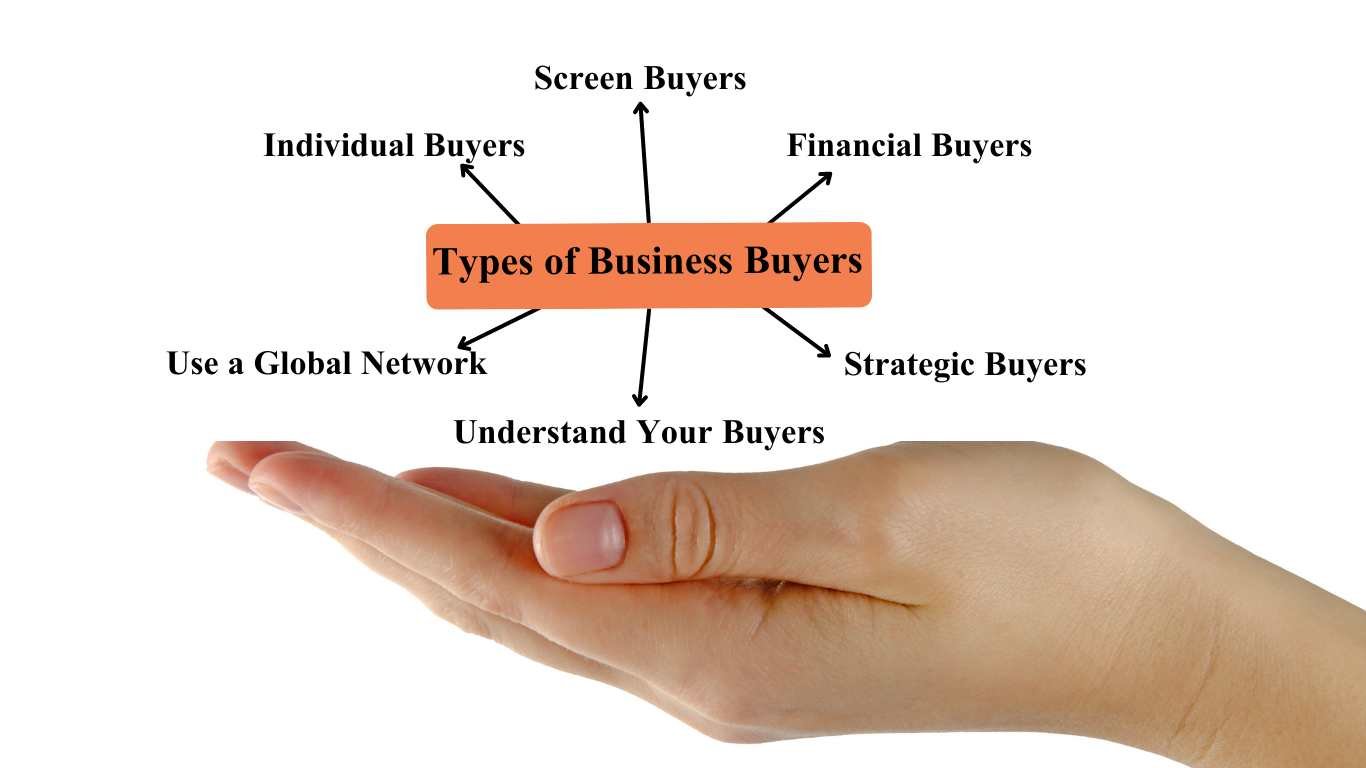Business buyers are entities or individuals who buy goods and services for the use of a particular organization, unlike personal consumers. Their decision-making is influenced by aspects such as quality, price performance, and the degree of appropriateness to the organization’s objectives and often requires great detail and process.
Business buyers meaning
Business buyers usually do not include individuals who purchase products or receive services for their personal needs but for business intentions. Such buyers usually seek to purchase goods that will improve their operations, lower their expenditures, or give them a competitive edge.
The reasoning behind such buying behavior is economical: these firms purchase goods because it brings them money and additional benefits (quality, reliability, return of investments, etc. In many cases, this involves several people and substantial analytic efforts to achieve set business objectives.
Types of Business Buyers
Business buyers can be categorized into several types:
- Producers: Manufacturers or service providers who purchase raw materials or components to manufacture theirs.
- Resellers: Wholesalers, distributors, or retailers who acquire finished goods and sell them for a profit.
- Governments: Local or foreign institutions, jurisdictions, or administrations that purchase goods and services to provide to society.
- Institutions: Charitable associations, educational entities, or clinics that spend money on various goods and services to achieve their goals.
- Commercial enterprises: Non-residential companies are buying for operational requirements where the goods might be consumables like office supplies or equipment that boost productivity and efficiency.
Each category is characterized by the particular buying motives and purchase strategies.
Business buyers examples
Some examples of business buyers are.
- steel, rubber, and electronic components for the production of car.
- A retail chain such as Walmart buys inventory from suppliers to supply their stores.
- An organizational unit of governmental source supporting IT infrastructure through procurement of IT services and software.
- A Medical institution buys high-end medical devices and medication for treatment.
- Office furniture, computers & software licensing costs for other businesses set up a tech startup.
All such buyer’s target the same class of products or services. These products or services proportionate to business activities are acquired for the issues of quality, price, and assurance.
Business buyer behavior
Business buyer behavior is the series of steps or actions undertaken by an organization to acquire a good or service. Compared to ordinary consumers, business buyers consider characteristics that include price, quality, and the expected long-term utility of the product. Typically, this process includes several stakeholders including a manager, a buyer as well as experts, and every participant affects different aspects.
Usually, business undertakes longer purchasing processes involving needs identification, screening of suppliers, and negotiations as some of the steps. There is a distinct relationship that exists between a supplier and a customer, which in many instances may lead to a long-term relationship, strengthened by the performance of both parties. Other than just the buying price of the business products, business buyers also take into account the total cost involved in owning and using the items.
Other factors that come into play include the market, the prevailing economy, and changes in technology that cannot be ignored. For example, when the economy is bad, there is a need to cut costs hence businesses in such conditions target the low end of the market. Thus, to market and sell their products to businesses achieving success, for these have been proven important, is a different phenomenon as compared to marketing and selling through a business to individual consumers.
How many buyers are on sap business network

By 2024, SAP Business Network had more than 7 million buyers. The buyers include companies of all sizes as well as solo and small corporations from different sectors. The network helps both buyers and suppliers to source, procure, and manage supply efficiently because of the available network of suppliers. This way, buyers can manage the purchasing cycle effectively by eliminating, addressing, and enhancing compliance and supplier management.
In addition, instruments that help control the transaction, and ordering process, and maintain order in the procurement cycle are also offered by the SAP Business Network. This is essential in achieving the strategically important goal of any organization – increasing the efficiency of business processes while decreasing costs.
What is the primary difference between business and consumer buyers?
The primary difference between business buyers and consumers lies in the decision-making process. In the case of business buyers, they consider cost, value for purchasing over time, the needs of the organization, and many other factors, and therefore they tend to have more than one person involved in the purchase.
On the other hand, consumer buyers base their purchase decisions on internal factors, feelings, needs, and other elements with a more concise trajectory to the purchasing decision.
Which of the promotional elements is most effective for business buyers?
Personal selling is particularly adapted for business buyers. It is a type of marketing strategy that seeks to establish contact with clients or target customers by using the company’s sales team.
This enables making presentations, demonstrating the product, and providing individual solutions to the issues at hand. This is necessary because business clients are often looking for answers to several questions and for a lot of reassurance, reasoning, and persuasion, which makes personal selling reasonable as it builds and develops business prospects.
What are Some Responsibilities of Buyers?
The industrial marketer must recognize those involved in the purchase decision-making process. Buying centers include everyone or any unit that is involve in such procedures. Individuals who request a purchase or acquisition are referre to as initiators. Users are the initiators of the purchasing process since they use things. Influencers are individuals inside an organization who influence decision-making by delivering information about purchase needs.
Decision-makers, such as engineers, are members of the organization with the authority to make purchasing decisions. Gatekeepers are members of the organization who have the authority to prevent sellers or information from reaching buying center members. These could include receptionists, secretaries, and purchasing agents. Approvers are the people who authorize the transaction. Buyers have the legal authority to select the supplier and negotiate the buying terms.
How do business brokers find buyers?
When it comes to finding buyers for businesses, brokers use many means to find potential purchasers including wholesaling, trade fairs, industrial contacts, listing databases and so on. They extend their use of the media to the internet, direct-response marketing as well as promotional and advertising methods more generally. They may also utilize their abilities to help find and approach a specific type of buyer or investor who is interested in purchasing businesses in a particular sector.
Business promissory note buyers
Business promissory note buyers are investors that buy promissory notes from businesses and in return the business gets instant cash flow. They are experts at buying these financial instruments. Usually acquiring them for a fraction of their value and providing businesses with cash while inheriting the default risk.
Challenges of Strategic Buyers
In most cases, sellers want to find a buyer who is fit for their company. All enthusiastic business founders desire to see their companies prosper after exit. Strategic purchasers are frequently willing to pay a premium for synergies resulting from acquisitions. While this may appear to be the finest departure choice available, it has its own set of issues.
Experience: Strategic buyers are frequently experienced purchasers who will attempt to manage the sale process and interrupt talks in order to remove any power that sellers may have. Strategic purchasers perform extensive due diligence, which is why such transactions are frequently lengthy and tiresome. Sellers will spend a significant amount of time gathering papers for due diligence and responding to buyer inquiries. This approach may distract the buyer from operating the business, impact performance, and allow the buyer to negotiate a lower sale price.
Credibility: Additionally, the vendor must maintain credibility with the buyer. Overestimating estimates or underestimating risks may lengthen the process or even result in the sale falling through; therefore, it is vital to maintain transparency.
Maintaining confidentiality is a significant difficulty in this situation. Employees who are aware of a potential sale may have concerns about their job security.
In such cases, it is advisable to interact with employees and reassure them of their job security. Sellers might incentivize essential employees by providing ‘stay bonuses to keep them from leaving.
Who is the Right Buyer for My Business
The best buyer for your firm is determined by a variety of criteria, including industry, nature of operations, company size, and timing.
Institutional purchasers typically acquire larger enterprises with significant development potential and scalable operations, whereas individual buyers purchase smaller owner-operated businesses. Advisors and brokers will assess the buyer’s financial skills and ability to take over to ensure the business’s long-term viability.
Buyers come in various shapes, sizes, and forms. However, they all have a few common threads:
1. Motivation to close a transaction.
2. The need to act now.
3. Financial ability.
4. Knowledge and skill to take over and manage a business.
Marketing to the Right Buyers
Understand Your Buyers Understand Your Buyers
To promote to the ideal buyer, you must first determine who will be purchasing your firm. Determine the types of buyers who will most benefit from your type of business. If you own a small firm, you will want to promote it to individual customers. If you have a corporation with multiple divisions, you should pursue a more strategic or financial purchaser.
Use a Global Network
When selling a firm, you should deal with a business broker who can market it effectively. Business brokerages, like Beacon Advisors, have vast global networks and promote your business listing extensively to guarantee it reaches the proper purchasers.
Screen Buyers Screen Buyers
To successfully market and sell your firm, you must identify the buyers who are most likely to complete the transaction. Working with a business brokerage might help you streamline your marketing to reputable purchasers who will be screen before advancing.
What is a business buyer?
Business buyers usually do not include individuals who purchase products or receive services for their personal needs but for business intentions. Such buyers usually seek to purchase goods that will improve their operations, lower their expenditures, or give them a competitive edge.
What are the examples of business buyers?
Business buyers could be private equity firms, strategic acquirers (usually competitors or corporations looking to penetrate your market), individual high-net worth investors, venture capitalists, and competitor companies expanding.
What is a consumer vs business buyer?
A consumer buyer is one if he/she buys goods or services for personal use and then a business buyer refers to a person who purchases goods or services due to work demand (re-sale).
What is marketing to business buyers?
Business marketing is orientate towards organizations and involves that meets the operational needs of businesses.
What is a B2B buyer?
A B2B buyer is any purchaser of a product that will be use by his organization, to make other products or services later on.
What are the types of business buying situations?
Three sorts of buying scenarios influence how the DMU is organizd and how products and providers are chose: straight rebuy, modified rebuy, and new-task purchase.

